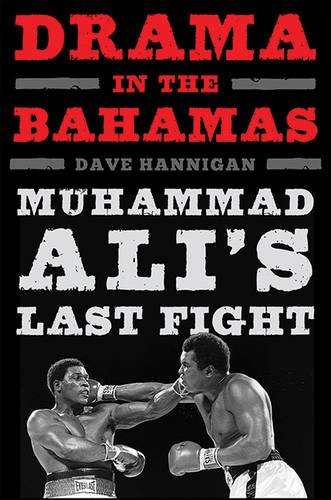WHAT WE NEED IS MORE COWBELL
New book relives Ali's final fight
by Don Stradley
 Muhammad Ali’s last fight was a disaster, epitomized by the
infamous cowbell, borrowed at the last minute from a local farm because the
half-wits running the show had forgotten that boxing matches needed a bell to start and end
rounds. There was the rickety stadium, erected just before the bout, as if it
were 1915 and Tex Rickard was setting up shop for Jack Johnson to inflame
America; and Ali, flabby and listless, struggling with Trevor Berbick, an
opponent Ali would’ve thrashed in better days. I watched it at the home of a
high school friend, one of the few in our grassy suburb wired for
cable-television. His mother watched with us, occasionally looking up from her
knitting to cackle at Ali’s pitiful effort. She was rude, but as we’re reminded
in Dave Hannigan’s Drama in the Bahamas: Muhammad Ali’s Last Fight, Ali’d become a
joke figure, with rumors of brain damage already a recurring topic where he was
concerned – when he visited England to promote the event, his BBC radio
appearances were axed because no one could understand him – yet, he was allowed
to fight. Like Elvis Presley or Veronica Lake, Ali’s final professional moments
were embarrassing. He was a burnt out bulb.
Muhammad Ali’s last fight was a disaster, epitomized by the
infamous cowbell, borrowed at the last minute from a local farm because the
half-wits running the show had forgotten that boxing matches needed a bell to start and end
rounds. There was the rickety stadium, erected just before the bout, as if it
were 1915 and Tex Rickard was setting up shop for Jack Johnson to inflame
America; and Ali, flabby and listless, struggling with Trevor Berbick, an
opponent Ali would’ve thrashed in better days. I watched it at the home of a
high school friend, one of the few in our grassy suburb wired for
cable-television. His mother watched with us, occasionally looking up from her
knitting to cackle at Ali’s pitiful effort. She was rude, but as we’re reminded
in Dave Hannigan’s Drama in the Bahamas: Muhammad Ali’s Last Fight, Ali’d become a
joke figure, with rumors of brain damage already a recurring topic where he was
concerned – when he visited England to promote the event, his BBC radio
appearances were axed because no one could understand him – yet, he was allowed
to fight. Like Elvis Presley or Veronica Lake, Ali’s final professional moments
were embarrassing. He was a burnt out bulb.
We’re told more than once in Drama
in the Bahamas that Ali was “jealous” of younger fighters like Ray Leonard,
Thomas Hearns, and Marvelous Marvin Hagler. He needn’t have worried, for all
three lacked personality. Hearns never said much. Hagler? A generic tough guy.
Leonard? Plastic as a beauty pageant winner. But even Ali’s persona seemed to
be shutting down by the time he faced Berbick. “The genie is gone from the
bottle,” wrote Hugh McIlvanney at the time, “and Ali is ready to be dumped
along with the rest of boxing’s empties.” Hannigan uses McIlvanney and other journalists
of the day like a cut-rate Greek chorus, each trying to outdo the other with his
prophecies of Ali’s doom. Even Eddie Murphy weighed in on Saturday Night Live, portraying Ali, not yet 40, as senile.
You could call the bummer in the Bahamas a cautionary tale, but
boxing people tend to ignore cautionary tales. The shopworn Ali’s battle to secure
a boxing license after Nevada refused him, a promotion run by ex-cons, in a
location not known for hosting boxing events, were old stories that harkened
back to boxing’s earlier days. They’ve since been repeated ad nauseam by dozens
of fighters. That the iconic Ali went through the paces of an ordinary broken
down pug made it all seem a little weird. Still, having watched the bout
recently on YouTube, Ali did better than I’d remembered. Even in his sorry condition,
he won some rounds. What was bizarre was the way he’d slump on his stool
between frames, his corner men praising him like a child who’d cleaned his
plate.
Berbick’s part in the Bahama drama, which was almost played by
Renaldo Snipes, is well covered. In fact, Hannigan concludes with a long
chapter on how Berbick became a paranoid religious zealot, eventually meeting
his end thanks to a lead pipe swung by an angry nephew. But finishing on such a
note gives the book an uneven texture. Harrigan teaches history at a Long
Island community college, and his book feels like a history lesson:
informative, but plain. One could’ve aimed machine guns at the memories of
Queen Elizabeth’s Sports Centre in Nassau and fired upon those involved, especially
Ali’s entourage, smiling stupidly as he sputtered through half-hearted gym
sessions. Shame, too, on Ali’s parents, his wife, his cook, all as bad as the
relatives of a dotty royal who indulge the old fool’s whims for fear they’ll be cut from the will. And was Ali
so divorced from reality that he didn’t realize how far he’d fallen? Even his
ring walk looked odd, like the unsteady gait of a mental patient out for a
stroll. Hannigan quotes Phil Berger about there being “no empiric science of
analyzing the mind of a fighter,” and that’s true. But Hannigan might’ve tried,
instead of harping on the damned cowbell.
This comment has been removed by a blog administrator.
ReplyDelete